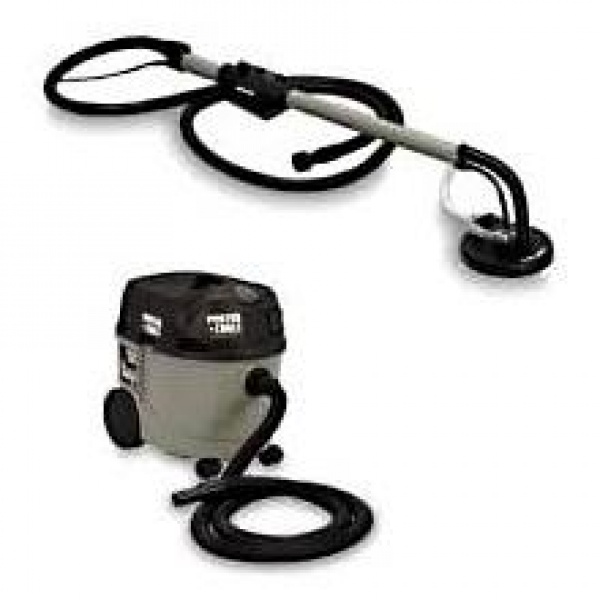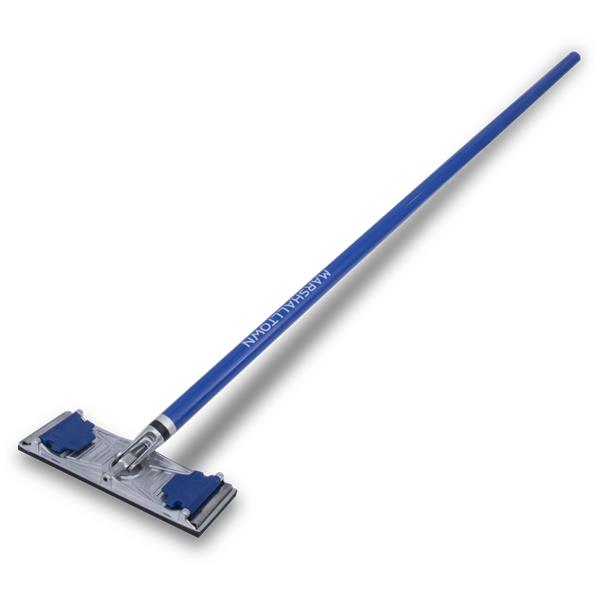
A drywall pole can sander is a great tool, regardless of whether you are a pro at DIY or just looking to do a few small jobs around the house. The process of sanding is straightforward and doesn't require any pressure. You should be aware of a few things before you use a polesander.
You must first ensure that you have the right sandpaper. You can either purchase pre-cut sheets or make your own. Use fine-grit paper. Try 100 or 150-grit if you're aiming for a smooth finish. You can go deeper with coarser sandpaper.
You will also need a drywall pole and sandpaper. These tools are designed to sand a variety of surfaces. These tools are ideal for sanding high-end drywall panels and ceilings. A hand sander will work, but it's not possible to sand walls. A drywall pole sander allows you to reach corners and is easier to maneuver. This means you can get the job done more quickly and efficiently.

A pole sander's other advantage is its lighter weight and compact size. You can buy an extension pole to use with your sander if you have tall areas to sand. You can even store some pole sanders in a foldable form for future projects.
An automatic dust collector is one feature that you should look for in a sander. A dust collection attachment can help you save a lot of time and effort. Dust can be reduced by using a plastic sheet to cover the floor while you are working. Moreover, you'll also want to wear a respirator to avoid breathing in the dust.
Once you've chosen the best sander for your job, you need to know how it should be used. Make sure that you have enough sandpaper to complete the task. Take a look to your project to find the right amount of paper.
When it comes to sanding, you'll need to keep the sanding head slightly angled. You shouldn't have the sander head perpendicular or parallel to the pole. While you are sanding, it may be necessary to keep the sandinghead in place. You can also attach clamps to your Sandpaper.

For a smooth finish, you'll need to sand the drywall thoroughly. Fine-grit sandpaper will be the best choice for this job. Fine-grit sandpaper is the best for this job. A sandpaper which has a lower grain removes more material. Conversely, a sandpaper which has a high degree of aggression can cause too much scraping. Choose a grit that is appropriate for your project.
You can choose an electric sander depending on your budget. This is powered by a motor. Or, you can buy an orbital power sander. A vacuum hose can be hooked up to the machine for dust elimination.
Other tools are also available such as sanding sponges or sanding blocks. If you don't feel like sanding with a sander you can try troweling joint compound.
FAQ
How do you renovate a house with no money?
The following steps should be taken when renovating a house without any money:
-
Plan your budget
-
Find out which materials you require
-
Decide where you want to put them
-
Make a list.
-
Figure out how much money you have available
-
Plan your renovation project
-
Get to work on your plans
-
Do some online research
-
Ask your family and friends for assistance
-
Be creative!
How can I prevent being scammed when renovating my house
Knowing what you're paying for is the best way to avoid being scammed. Make sure you read every word of the contract before signing it. Also, don't sign blank contracts. Always ask for a copy of the signed contract.
How do you sell your house quickly and without the need to pay realtor fees
Start looking for buyers right away if your goal is to sell quickly. You should be open to accepting any price offered by the buyer. However, if you wait too long, then you will probably lose out on some potential buyers.
How Much Does It Cost To Renovate A House?
The type of material, the project size and the complexity of renovations will all impact the cost. Wood, for example, requires additional tools such as saws and drills. Steel, however is not so dependent. The price for renovations will also vary depending on whether you would like your contractor to do all of the work for you or if it is something you prefer.
Home improvements can cost anywhere from $1,000 to $10,000 on average. The average cost of home improvement projects would be between $5,000 and $25,000. The cost to hire professionals would range from $5,000 to $25,000,000. On the other side, you could spend up to $100,000 if your task is completed entirely yourself.
There are many factors that influence the final cost of renovations. You should consider the material used, such as brick vs concrete. Brick vs. concrete, the project's size, the number and duration of workers, etc. When estimating the total cost for renovation, it is important to keep these factors in your mind.
Statistics
- The average fixed rate for a home-equity loan was recently 5.27%, and the average variable rate for a HELOC was 5.49%, according to Bankrate.com. (kiplinger.com)
- Design-builders may ask for a down payment of up to 25% or 33% of the job cost, says the NARI. (kiplinger.com)
- It is advisable, however, to have a contingency of 10–20 per cent to allow for the unexpected expenses that can arise when renovating older homes. (realhomes.com)
- Most lenders will lend you up to 75% or 80% of the appraised value of your home, but some will go higher. (kiplinger.com)
- A final payment of, say, 5% to 10% will be due when the space is livable and usable (your contract probably will say "substantial completion"). (kiplinger.com)
External Links
How To
5 Things You MUST Know Before Starting Your Home Renovation
-
Are you sure that this is something you want to do? It's likely that you will need assistance if you plan to tackle a large home improvement project, such as remodeling your kitchen or bathroom or building a new home. However, if you feel unsure about your ability to complete such a big task by yourself, you might consider hiring someone to help you. You could lose a lot of time and money and not reap any real benefits. Why not get someone who is experienced to assist you? They'll save your time and make it easy for you to have a wonderful place to call home.
-
What amount should I spend on a renovation project? This is a common question, but it can make renovations more expensive. You'll likely have to repay most of your costs at the end. You should stick to your budget, even if it's a tight one. Otherwise, you could end up paying a fortune without getting anything in return.
-
Do I hire professionals or do I need to DIY? - While there is no right or wrong answer, we recommend that you hire professional tradespeople if possible. You can trust them to provide you with advice and guidance on how to proceed with your job. For example, they'll be able install the plumbing correctly, ensure that everything is done safely, and provide you with a warranty when they finish their work. DIY projects can be frustrating because they require a lot more trial and error. This means that you will have to learn many lessons from the experience. There will be many problems along the way.
-
What are my options? - Do not underestimate how expensive a renovation project will cost. Even if the project seems manageable, it could prove costly and you will need to borrow money. It is also important to consider the selling price of your current property when you plan on selling it soon after you have completed the renovations.
-
Where do I start? There are no right or wrong places to begin when choosing where to start. But we suggest you choose something that you enjoy working on. If you enjoy what you do, you will be more motivated to continue working and less likely procrastinate. Avoid places that need a lot of attention. If you have to deal with dirt and dust, don't try to redecorate the living room.